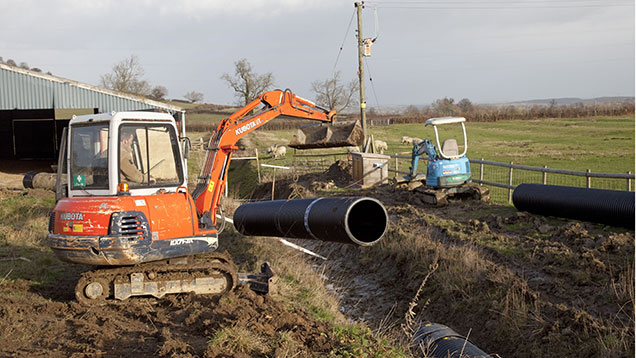Business Clinic: How to negotiate water pipe compensation
 © REX
© REX Farmers Weekly Business expert Sam Kirkness, give advice on claiming compensation after water works on your farmland.
Q: We had just drilled our winter wheat this year when we received a notice from our regional water company, which stated that they would be taking entry to our land to lay a new water pipe to serve a nearby development. Do I have any powers to object to the notice and what compensation am I entitled to?
See also: Business Clinic: RPA inspection penalties – should I appeal?
A: Assuming the water company has given you reasonable notice (typically three months or more) of their intention to take entry of the land, I’m afraid there are limited grounds for objection.
“Water undertakers” (who are appointed under the Water Industries Act 1991) possess powers to enter land to lay pipes and inspect, maintain, adjust and repair them.
If agreement cannot be reached by negotiation, they are also in a position to acquire the rights by compulsory purchase.
Therefore, the critical thing is to ensure you are compensated for all losses that are a reasonable consequence of the pipe laying works.
We are frequently asked to negotiate compensation claims with water undertakers and the critical thing is to commence your discussions as soon as the notice has been served or even beforehand if possible.
The notice period can often be short and so an early start allows time to consider all of the likely losses and practicalities and if appropriate, you can also agree an advance part-payment of compensation so you are not left out of pocket before the full extent of the damages is known.
You are entitled to recover all of your reasonable professional fees from the water undertaker as part of your final claim, so take advice at an early stage.
A recognition payment should be negotiated for the pipe itself and this should broadly cover an agreed proportion of the value of the land affected by the rights, rather than simply the land where the pipe lies.
Additional payments should also be negotiated for manholes, chambers, valves and marker points. It is important to ensure with the water undertaker that the pipe or pipes and equipment are laid at an appropriate depth to avoid on-going damage to farm machinery.
Your disturbance claim should cover all losses that are not “too remote from the works themselves”.
As a minimum, this should include crop losses, future crop losses and yield reductions over the period the land is recovering; costs of restoring the land, fences, hedges and gates; costs of replacing lost fertility and controlling weed cover; loss of single farm payment (further complications have emerged under the new Basic Payment Scheme rules whereby any entitlements not claimed in 2015 will be lost.
So take note of this for pipe laying works in 2015); compensation for possible environmental stewardship penalties; and costs of replacing top soil where subsidence occurs over the working strip in the future.
To cover this, seek a commitment in the agreement from the acquiring authority to return to the site and make good any additional damage, commonly subsidence.
Agreeing swift settlement with the water undertakers can be a challenge, so ensure that interest is paid on the agreed claim from the date of entry on to the land up until the date of settlement.
The information provided in these articles does not constitute definitive professional advice and is provided for general information purposes only.
Do you have a question for the panel?
Outline the issue in no more than 350 words and Farmers Weekly will put your question to a member of the panel. Please give as much information as possible and send your inquiry to Business Clinic, Farmers Weekly, RBI, Quadrant House, The Quadrant, Sutton, Surrey SM2 5AS. You can also email your questions to fwbusinessclinic@rbi.co.uk or post your question as a comment below this story.
